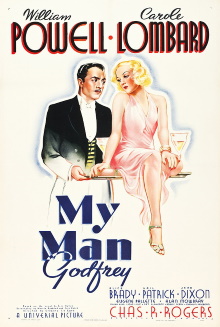Here is another screwball comedy from the classic Hollywood era starring two of the biggest stars of the era, William Powell and Carole Lombard. The director here, Gregory La Cava, isn’t as well known but he did lead a career as a pre-Disney animator before he started making films, and that might explain the rather creative animated opening title card used in this film. This is only one of the many comedies of this era but I think it is an exceptionally good one, well suited to distract audiences from the then still ongoing Great Depression.
Godfrey is one of the many jobless, homeless bums who live at the city next to the river. One evening a rich socialite Cornelia Bullock comes by and offers him $5 if he would return to a party with her, as the target of a scavenger hunt game. He rejects her due to her arrogance but when her sister Irene comes by next and begs for help to beat Cornelia, he agrees. Godfrey witnessing the antics of the rich at the party is angered but he accepts Irene’s offer of a job as a butler at her family’s home. There he finds that the two sisters and their mother are spoiled and very out of touch with how the real world works while their father is exasperated by how much money they spend to keep up their standard of living. Godfrey proves to be a surprisingly competent butler however even as Cornelia tries to make things difficult for him while the dumb but kind Irene seems to have genuinely fallen in love with him. The audience realizes that Godfrey is more than he seems when another scion of a rich family shows up at a party and recognizes him as a friend from Harvard.
It’s a silly premise and it’s rather hard to explain why the humor in this film works, yet it does. It’s all about the antics of the Bullock women being outrageously blasé about the standard of luxury they are accustomed to such as the mother having an artiste around the house as a sort of pet intellectual named Carlo. The father’s frustration is played for laughs as well and the film for the more most part avoids being mean. Even when Cornelia tries to cause trouble for Godfrey, it’s because we can tell that she really likes him, making this a very early example of the tsundere trope. The one exception is when Irene throws a tantrum and her mother, wanting her to cheer up, orders Carlo to act like a monkey for her amusement and he reluctantly complies. It’s an ugly scene that illustrates how the power and privilege of money is good and real and how the poor are willing to debase themselves for some of it. I think the inclusion of this one scene is rather brilliant as it gives a bit of bite underneath the silliness and Godfrey reacts very uncomfortably to this self-abasement.
You can tell that this film is tailor made for the Depression era in that the masses can enjoy a bit of escapist fun in watching the fabulous lifestyle of this flamboyantly rich family. Yet at the same time, they can make themselves feel better by seeing how stupid the Bullocks are and so internalizing the moral that money doesn’t make them better people. On the other hand, these films can never resist making the hero actually rich and Godfrey was always suspicious in how well-spoken and well-mannered he is. Both of us also really disliked the ending. Godfrey is being so reasonable and rational in explaining to Irene that the two of them are better off as friends but I suppose it was too much to ask from the Hollywood of the era to be content to leave things like that. It’s just that Irene is portrayed as being so childish and stupid that it’s impossible to see why Godfrey would even be interested in her.
Anyway, old as it is, this is a solidly funny and entertaining film. La Cava is excellent as the director but we shouldn’t underrate the skill required of Powell in portraying the straight man either and delivering his lines with perfect comedic timing. As an interesting note, Powell was paid US$87,500 for his role in this. This doesn’t sound like much by modern standards, but they talk about Cornelia’s expensive necklace being worth mere thousands of dollars. This should give you an idea of how well paid Powell was in terms of the economy of the era.
